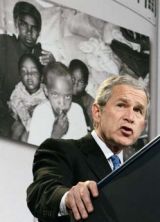Bush says “frustrated” with UN, AU over Darfur force deployment
By Wasil Ali
January 4, 2008 (WASHINGTON) — US President George Bush expressed frustration over the slow pace of deploying the UN-AU hybrid force to the war ravaged region of Darfur.
 “I have been frustrated, frankly, with the pace of the United Nations and the AU to get troops in there” Bush told a group of Arab reporters at the White House today.
“I have been frustrated, frankly, with the pace of the United Nations and the AU to get troops in there” Bush told a group of Arab reporters at the White House today.
A joint African-United Nations force took over peacekeeping duties in Darfur on Monday and existing AU forces switched their green berets to the UN blue ones. The transfer of authority has been largely symbolic.
Sudan not signed off on the Status of Force (SAF) agreement that governs the work of the new force. It has refused to allow night flights — except for medical evacuation — or large U.N. cargo planes.
Additionally, the government has attempted to require the force to give it advance notice of all movements and to ensure that its military can scramble U.N. radio communications when it is conducting operations.
Sudan has also refused to allow non-African units in Darfur including Swedish, Thai and Nepalese troops.
Bush stressed that the deployment of the hybrid force is crucial for enforcing security in Darfur.
“My concern is about the individual that’s out in the remote regions of Darfur, maybe going hungry, definitely worried about violence” he said.
He added that the peacekeeping force’s main task is to “help the folks who are living in these dispersed camps have a normal life”.
The US president also signaled impatience with the splintering of Darfur rebel groups saying that it is impeding the peace process.
“There has to be cohesion amongst the rebels and a genuine, real peace process where people sit down seriously — to seriously discuss a better way forward” Bush said.
Major Darfur rebel groups have boycotted the latest round of peace talks in Libya for different reasons including the demand of peacekeeping force deployment.
“The rebel groups cannot take advantage of — continue to take advantage of this notion that they can do what they want without being serious about the peace” he added.
Bush said that the sanctions imposed by the US were not directed at Khartoum only but also to the Darfur rebel leaders.
Last May Bush ordered stiffened sanctions on Sudan that will bar 31 companies controlled by the government from doing business in the U.S. financial system as well as sanctions on four Sudanese individuals, including two senior Sudanese officials and a rebel leader suspected of involvement in the Darfur violence.
“We have participated by sanctioning, to send the signal that we expect the government to participate seriously. And we’re also, by the way, as I told you, we sanctioned a rebel leader, trying to send the same message” he said.
The US president voiced support to the mission of Jan Eliasson, the Secretary-General’s Special Envoy for Darfur, in trying to unite the rebel groups.
However Bush made no mention of Salim Ahmed Salim, AU envoy for Darfur who is working with Eliasson on the political track. The US president also did not praise the role of the AU as he normally does when speaking about Darfur in the media.
The omission may signal the US administration’s dissatisfaction with the African Union’s leadership.
Last September the US criticized the African Union and accused it of slowing the deployment of the hybrid force in response to statements by AU chairman.
African Union Chairman Alpha Oumar Konare has issued a warning at the time to Western nations saying that “financing is important, but it does not authorize’ intervention”.
But U.S. Ambassador at the UN Zalmay Khalilzad responding to Konare’s statements said that UN members are picking the tab on the hybrid force which means that non-African troops must be included.
“The African Union secretariat needs to move” Khalilzad said.
International experts estimate 200,000 people have died in the conflict, which Washington calls genocide, a term European governments are reluctant to use. The Sudan government says 9,000 people have been killed.
(ST)
